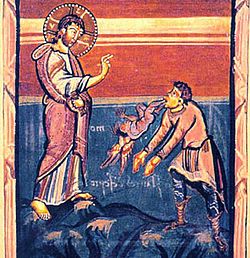I’m not sure I believe in ghosts, but I am certain haunting is real.
I’ve known plenty of people who’ve been haunted.
Maybe it’s the heavy hand or the sharp rebuke of a parent who’s been gone for ages but not really gone…never really gone.
Or the memory of wartime service. Over but never really over for those who are home, but never fully home.
Or all the ways we seem to push people away for all the reasons—the ones we get to leave only to be astonished when it turns out that they’re gone.
The last few days I’ve thought a lot about all those people returning to their homes in Gaza, grateful for the cease-fire, eager to get back and get on with rebuilding their lives such as they can, and yet: how could you walk through your old neighborhood and not remember what was? Wouldn’t it be wrong not to remember, and yet awful?
How could you not feel the weight of it all?
If that’s what haunting is, I’ve seen it.
And so in this morning’s Gospel story about the ten lepers, I wonder if part of what we’re supposed to imagine is a group of people who aren’t simply sick but also haunted.
Because their lives had all begun so differently.
Because the memory of how quickly it had all changed for each of them would have to have been so painful and so present in their minds – a continuous playback of awful images and unforgettable words.
There was no place for people in their situation – no home, no harbor.
Just the reality of their condition and the reckoning of all they’d lost.
So when Jesus shows up, and they call out to him, and he calls back with the good news of a cure, I get why nine of them don’t waste a second before going back to the future.
Back to the lives they’d once known.
And I hope that’s exactly what they got, picking it all back up without missing a beat, like the prodigal son.
But the odd man out, that one who turns back to kneel at the feet of Jesus—he’s in a different category.
I’m reluctant to say that he’s actually more grateful than the others—that his cup overflows in a way theirs don’t.
I don’t think it’s that.
But I think he’s beset by a different sort of haunting.
Because like the others, he’s seen some stuff.
The sadness of his exile from home (because that was what happened to lepers); the fear and disgust of those he would have encountered on the road; the suspicion running wild through any town he passed by, certain he would be trying to find his way in wherever he could; the loneliness and boredom of being ill; the occasional kindness of a meal left out, a spare blanket, neatly folded, or a blessing sent his way.
My guess is that, unlike the others, what suddenly haunts him in his first moments of restoration is the possibility that he might forget the lessons he has learned.
That he might become blinded once again to all the things he’s seen and to all these things he’s learned the hard way.
When he comes to kneel before Jesus, it’s not just because he’s an ex-leper, a man among a group miraculously cured.
He comes to kneel before Jesus because he recognizes he’s a person who has been transformed, a person who won’t unsee what he’s now seen or un-know what he now knows.
He doesn’t want to.
It’s too important.
He turns around to approach Jesus because he’s already been turned around.
He’s a witness to the worst and best that life has to offer, the empty cup and the one that floweth over—and now his charge is to learn to live from that place.
For me, the man who turns back to say thank you is a model of our faith at its best: clear-eyed about the world, full-hearted with the redemptive purposes of God, and trying to find a way to walk with love in the space between.
Given what he’s seen and been through, what sort of human brokenness could possibly faze him now?
And doesn’t that make him an incredible force to be reckoned with?
Not a force in the world’s familiar sense of that term, but according to faith’s vision.
Because when faith talks about force, it means things like the strength it takes to be gentle, or the stamina it takes to be kind.
It’s not talking about coercion, but conversion – the invitation to a broader view that can only come from one who has started on the journey toward a different country and hopes that we might find it in ourselves to come along.
And this guy is like that.
We began by talking about haunting.
There is so much that people seem haunted by.
There are so many parts of ourselves and of our stories that loom large – so much that we’d just as soon forget, except that we can’t.
Some things won’t let themselves be forgotten.
In this morning’s gospel, I think the nine men who skedaddle are acting out of a fantasy that I’m not sure I have, anymore.
They’re hoping to rewrite their story – to change the ending and make their time in the wilderness into some sort of brief aside.
The one who turns back approaches the moment differently.
He turns back and kneels to mark the beginning of a new chapter – a chapter in which everything he’s been through becomes a way to connect…engage…to get down to business.
I’d like to be more like that.
In our tradition, the root of the word “redemption” means “to buy back.”
And isn’t that what Jesus shows us we might do: buy back some of the world’s brokenness and confusion, its despair and unfairness, and not because we’re blissfully above and beyond it, but because we are those who know it all too well, and yet who persist in working for a new day?
In a gospel that speaks so pointedly about the instinct to keep our distance, the question becomes: how close to Jesus are we willing to get?
Amen.









